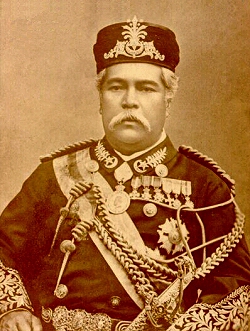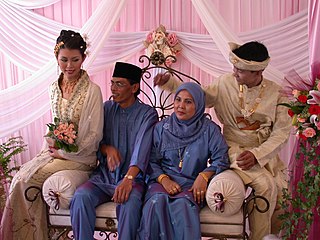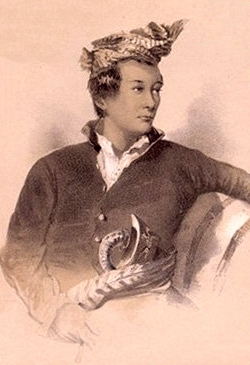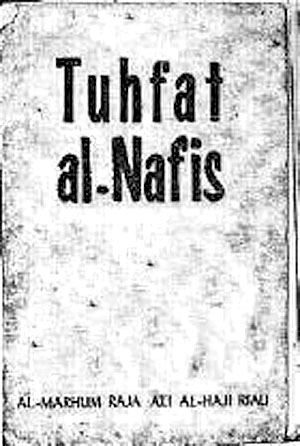Related Research Articles

Sultan Sir Abu Bakar Al-Khalil Ibrahim Shah ibni Almarhum Temenggong Seri Maharaja Tun Daeng Ibrahim Al-Aydarus was the Temenggong of Johor. He was the 1st Sultan of Modern Johor, the 21st Sultan of Johor and the first Maharaja of Johor from the House of Temenggong. He was also informally known as "The Father of Modern Johor", as many historians accredited Johor's development in the 19th century to Abu Bakar's leadership. He initiated policies and provided aids to ethnic Chinese entrepreneurs to stimulate the development of the state's agricultural economy which was founded by Chinese migrants from southern China in the 1840s. He also took charge of the development of Johor's infrastructure, administrative system, military and civil service, all of which were modelled closely along Western lines.

Malay Singaporeans are Singaporeans with general ancestry from the Malay world. They constitute approximately 13.5% of the country's citizens, making them the second largest ethnic group in Singapore. Under the Constitution of Singapore, they are recognised by the government as the indigenous people of the country, with Malay as the de jure national language of Singapore.

The Johor Sultanate was founded by Sultan of Malacca Mahmud Shah's son, Alauddin Riayat Shah II in 1528.

The Sultan of Johor is a hereditary seat and the sovereign ruler of the Malaysian state of Johor. In the past, the sultan held absolute power over the state and was advised by a bendahara. Currently, the role of bendahara has been taken over by first minister with the constitutional monarchy system via Johor State Constitution. The sultan is the constitutional head of state of Johor. The sultan has his own independent military force, the Royal Johor Military Force. The sultan is also the Head of Islam in Johor state.

Sultan Ali Iskandar Shah I ibni almarhum Sultan Ahmad Hussein Muazzam Shah I was the 20th Sultan of Johor, who succeeded his father, Sultan Hussein Shah after the latter died of natural causes in 1835. Over the next twenty years, Sultan Ali's claim to being the Sultan of Johor were only recognised by some merchants and a few Malays. Like his father, Sultan Ali was a puppet monarch and played a minimal role in the administrative affairs of the state, which came under the charge of the Temenggong and the British. In 1855, Sultan Ali ceded the sovereignty rights of Johor to Temenggong Daeng Ibrahim, in exchange for formal recognition as the "Sultan of Johor" by the British and a monthly allowance. Following the secession of Johor, Sultan Ali was granted administrative charge over Muar until his death in 1877, and in most administrative matters, was often styled as the "Sultan of Muar".

Sultan of Selangor is the title of the constitutional ruler of Selangor, Malaysia who is the head of state and head of the Islamic religion in Selangor. The current monarch, Sultan Sharafuddin Idris Shah ascended the throne on the death of his father, on 22 November 2001.

Tuhfat al-Nafis is a work of Malay literature written by the Bugis Raja Ali Haji in Jawi in around 1866–1870. who is of Malay-Bugis descent. It records and chronicles events, especially those of the 19th century, that occurred in several Malay states. Some of the events recorded in the work include the founding of the state of Terengganu, the murder of Sultan Mahmud Shah II of Johor and of explaining the relationships between the Bugis and the kings of Johor and Sumatra. Tuhfat al-Nafis means "the precious gift" in the Arabic language.
Paduka Sri Sultan Mahmud Shah II ibni al-Marhum Sultan Ibrahim Shah was the Sultan of Johor, Pahang and Lingga. As he was young upon assuming the throne, regents oversaw the affairs of state in Johor until the death of the Bendahara in 1697. Upon assuming duties as sultan, Mahmud Shah II undermined Johor's stability due to his erratic behavior. As a result, he was murdered by members of his advisory council in 1699. His death led to a period of upheaval and chaos in the southern Strait of Malacca, as successors fought for control of the state.

Sultan Hussein Mua'zzam Shah ibni Mahmud Shah Alam was the 19th ruler of Johor-Riau. He signed two treaties with Britain which culminated in the founding of modern Singapore; during which he was nominally given recognition by the British as the Sultan of Johor and Singapore in 1819 and the Sultan of Johor in 1824.

The Kangchu system was a socio-economic system of organisation and administration developed by Chinese agricultural settlers in Johor during the 19th century. The settlers organised themselves into informal associations, and chose a leader from among themselves.
Dato' Bendahara Seri Maharaja Tun Habib Abdul Majid was the 19th Bendahara of the Johor Sultanate during the late 17th century. The Johor Sultanate under Sultan Mahmud Shah II saw a gradual decline of royal authority during Tun Habib's tenure as the Bendahara of Johor. Internal challenges within the Sultanate faced by Tun Habib consolidated his power as the Bendahara, in which case the Bendahara monopolised legitimate authority over the Johor Sultanate by the 1690s. After his death, Tun Habib's descendants spanned throughout the Johor Sultanate and established ruling houses in Riau-Lingga, Johor, Pahang and Terengganu.

Raja Haji Fisabilillah (1727–1784) was a Bugis-Malay warrior, and also the Yang Dipertuan Muda of the Johor Sultanate from 1777 to 1784.
Paduka Sri Sultan ‘Abdu’l Jalil IV Ri’ayat Shah Zillu’llah fi al-’Alam bin Dato’ Bendahara Sri Maharaja Tun Habib Abdul Majid was the Sultan and Yang di-Pertuan Besar of Johor and Pahang and their dependencies, who reigned from 1699 to 1718.
Paduka Sri Sultan Sulaiman Badr ul-‘Alam Shah Khalifat ul-Muminim ibni Almarhum Sultan ‘Abdu’l Jalil Ri’ayat Shah, or simply Sulaiman Badrul Alam Shah of Johor and known as Raja Sulaiman before his ascension to the throne was the 14th Sultan and Yang di-Pertuan Besar of Johor and Pahang and their dependencies who reigned from 1722 to 1760. He succeeded on the defeat of the claimant to Johor throne, Raja Kecil who reigned in Johor from 1718 to 1722.
Mahmud Ri’ayat Shah Zilu’llah fil’Alam Khalifat ul-Muminin ibni al-Marhum Sultan ‘Abdu’l Jalil Shah was the 17th Sultan of Johor and Johor's dependencies who reigned from 1770 to 1811. Exercising little power over the sultanate where actual power was held under the Bugis court faction, the Tuhfat al-Nafis nevertheless mentions him as an able statesman who did what he could against insurmountable odds, while Abdullah Abdul Kadir attests to his good character.
Sri Paduka Dato' Bendahara Paduka Raja Tun Abdul Majid ibni Almarhum Dato' Bendahara Sri Maharaja Tun Abbas, (1718–1802) was the 21st Bendahara of the Johor Sultanate, who was believed by historians to be the first Raja Bendahara of the Pahang Kingdom that gained effective control over the principality, following the gradual dissolution of the Johor by the end of the 18th century.

The Bendahara dynasty is the current ruling dynasty of Pahang, Terengganu and Johor – constituent states of Malaysia. The royal house were of noble origin, holding the hereditary position of bendahara in the courts of Singapura, Malacca and Old Johor since at least from the end of the 13th century.

Raja Temenggong Tun Daeng Ibrahim bin Temenggong Daeng Abdul Rahman was the Temenggong of Johor and later the de facto Maharaja of Johor from 1855 to 1862.
Dato' Temenggong Seri Maharaja Tun Sayyid Abdul Jamal bin Dato' Bendahara Seri Maharaja Tun Sayyid Abbas Al-Aydrus. was the first Temenggong of Johor. He is noted to be the direct ancestor to the current Sultan of Johor and the descendants of the House of Temenggong.
Raja Kecil, or Raja Kecik, also known as Sultan Abdul Jalil Rahmat Shah, was the first sultan of the Sultanate of Siak Sri Indrapura. A controversial figure, due to his origin tales and the rebellion he led, Raja Kecil united a multi-ethnic force in eastern Sumatra to defeat the Johor Sultanate in 1718. He then ruled Johor for four years, before retreating to eastern Sumatra, where he established a new state along the Siak River in 1722. The rulership of Johor was then passed to Sultan Sulaiman under the heavy dominance of the Bugis elites headed by, among others, Daeng Marewa.
References
- Ali, al-Haji Riau, Hooker, Virginia Matheson, Andaya, Barbara Watson, The Precious Gift: Tuhfat Al-nafis, Oxford University Press, 1982, ISBN 0-19-582507-1
- Bastin, John Sturgus, Winks, Robin W., Malaysia: Selected Historical Readings, KTO Press, 1979, ISBN 3-262-01216-5
- Carl A. Trocki, Prince of Pirates: The Temenggongs and the Development of Johor and Singapore, 1784-1885, Institute of Southeast Asian Studies, Singapore University Press, 1979
- Keat Gin Ooi, Southeast Asia: A Historical Encyclopedia, from Angkor Wat to East Timor, ABC-CLIO, 2004, ISBN 1-57607-770-5
- The Voice of Islam, Published by Jamiyat-ul-Falah., 1953
- Wilkinson, Richard James, Papers on Malay Subjects, Part I-V, BiblioBazaar, LLC, 2008, ISBN 0-559-62548-0